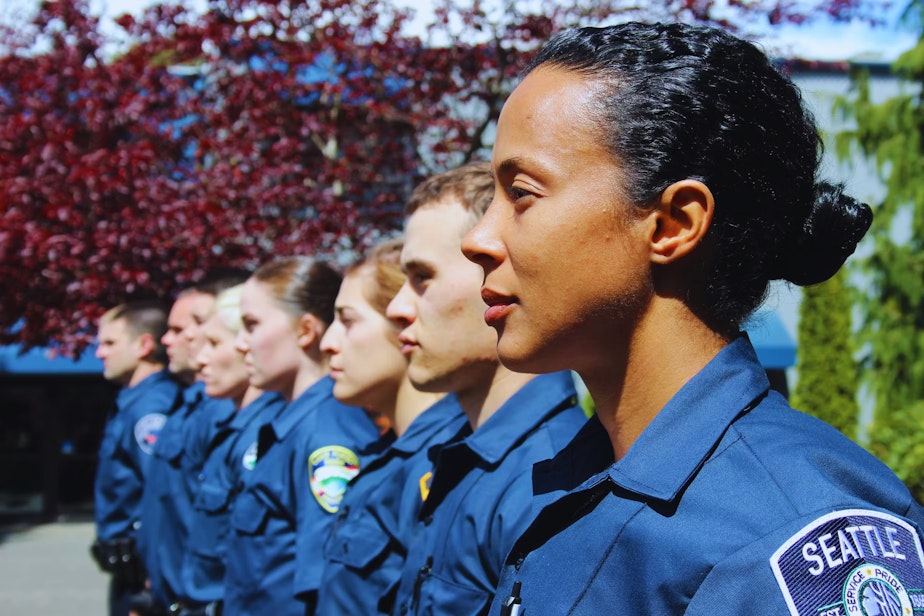Seattle Police is a 'good old boys club' where women struggle to get ahead, report says

One Seattle cop said a sergeant told her she “looked yummy” in front of other officers.
Another, with a child at home, said she wasn’t promoted because she couldn’t work the night shift, since her kid would be alone.
A third woman recalled a clique of male cops who never invited the lone woman from their graveyard shift to 5 a.m. breakfast, leaving her to patrol the streets on her own. “She’d be the one babysitting the city,” the woman said.
These anecdotes, what women said they experienced while working at the Seattle Police Department, were documented in a highly critical report submitted last September to the department as part of an initiative to promote women in law enforcement.
The so-called “30x30 report” is part of the department’s effort to hire more women officers, which is inspired by a national movement to have women make up 30% of police recruit classes by 2030. Seattle Police signed on to the initiative in 2021.
Sponsored
30x30 report
A report commissioned by the Seattle Police Department is highly critical of the department's "masculine" culture.
The report, which contains a list of quotes from these women, depicts the department as a “good old boys club” where female cops are sexually harassed, discriminated against because of their sex, and passed over for promotion.
Seattle Police commissioned Lois James, a researcher from Washington State University, to conduct the study. While James’ report doesn’t say exactly how many women were interviewed, she produced 80 quotes. The study was done in August of last year, but it does not specify when the women’s experiences took place.
Some women said their male colleagues spread rumors that they slept around.
“When I was a patrol officer… women's roles on the department we were kind of socially pigeonholed into four different categories. You were, incompetent, technically inept, shouldn't be a police officer, or scared to be on the street. A baby factory who, you know, got pregnant to get off the street quickly, and then got a dust job and stayed there forever. A slut who would sleep with anyone. Or just a bitch.”
Sponsored
Some women spoke about unequal treatment.
“A male captain that would order you around, but it wasn't in your chain of command, like he would ask us to do stuff that we had no business doing,” one woman said. “When we tell him no, he would circumvent and go to his buddies above us and get us to do stuff.”
“There's this place where you can eat, like a patio, open space. I'm not allowed there. I'm not on the list. I'm not on the list to go eat outside.”
They outlined difficulties in getting promoted, especially if they were mothers.
One woman said she wasn’t promoted because she was unable to work the night shift.
Sponsored
“I said, ‘Look I need you to give me any shift but the night shift, because frankly there was nobody home to look after my kid… [And the response was]… this is the only one we have available… So I guess I’m not getting promoted. But then I'll turn around and I see, um, a counterpart who is going through a divorce, and he gets a hardship transfer assignment, okay, no problem.”
Women said the feeling of being outsiders continued even after they were promoted.
“I was in her office when one of her new detectives came in to talk to her … She told him something, and he literally rolled his eyes at her.”
Women said they wouldn’t recommend that other women join the department.
“If I were to tell my daughters or my friends, I [would] tell them to run in the opposite direction, you know, because of the experiences that I've had.”
Sponsored
Several recommendations emerged from the report. These included a need for greater awareness of ongoing sexism and gender-based discrimination within the police department, a need for childcare options, and mentorship for women.
Seattle Police did not respond to an emailed request for comment. But Ted Buck, personal attorney for Chief Adrian Diaz, told KUOW last month by email that “the chief’s overt support of women in departmental leadership has been clear and consistent.”
Buck addressed the 30x30 report, saying that a large portion of Seattle Police executive command staff are women, and that the department joined the 30x30 Initiative because of Diaz.
The testimony gathered for the report echoes similar claims made by longtime police leader Deanna Nollette, who filed a lawsuit against Diaz and the department last month alleging that Diaz has a “history of misogyny” and would exclude women from travel, training, and networking opportunities.
One time, Nollette’s lawsuit says, Diaz created a flag football team for team building and Nollette brought up that maybe women would not want to play with their male colleagues. “The women can be cheerleaders,” Diaz allegedly said in response.
Sponsored
Buck called these claims "wholly unfounded.”




